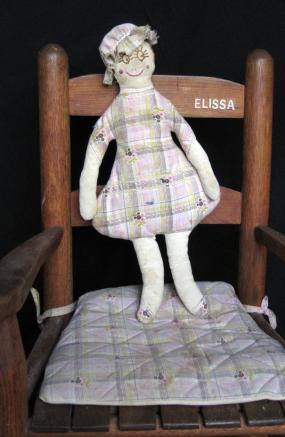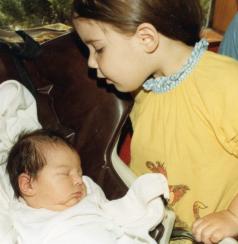
Because the doll matched the cushion, we often kept the doll on the chair, as shown in the picture to the left. Elissa toddled across this scene one day, and observed that the doll was standing on the chair, which she knew to be strictly forbidden. She waggled her index finger at the doll, and started bawling it out. Although she was talking to it emphatically, we really couldn't understand what she was saying, but it had an angry sound. The doll did not respond, and looking on, I thought, "Tar Baby, she aint sayin' nothin'." Note 1 Elissa's tirade got louder and louder, and more and more emphatic, but still the doll stood impassively on the chair, with a defiant smile on her face. Elissa, still waggling her finger at the doll, was now jumping up and down. Suddenly, she ran to the chair, grabbed the doll, and, yelling through her clenched teeth, fiercely bit its head! Margie and I, looking on, burst into laughter. Although Elissa already had quite a vocabulary when the above event occurred, we really hadn't been able to understand anything she said in her excited tirade. Come to think of it, I sometimes can't understand Elissa now, because she's a very fast talker. She's spoken to me at various times in English, French, and Spanish. The one I have the most trouble with is English, due to her speed. She's now teaching at Harvard, but she assures me that she speaks slowly and clearly in her classes. Anyone who's had children can attest to the wonderful utterances children produce. Elissa's first two-word sentence is legendary in our family. She spoke very early, starting to produce single words at about ten months. One Fall day, when she had just passed her first birthday, I was carrying her around the Christopher Columbus Waterfront Park in downtown Boston (she had tired of walking). She stared at the harbor in front of us, a boat basin about 125 meters (400 feet) across, surrounded by stone walls. And then she said, to nobody in particular, "Big bath". Margie once heard an interview with Frank McCourt, a teacher, and the author of Angela's Ashes. Discussing the joys of being a teacher, he said that teachers hear such wonderful stories. My younger daughter Sara, now a middle-school teacher, can certainly vouch for that. But as a child, Sara came up with some surprising utterances herself. Watching a presentation of The Nutcracker, a ballet by Tchaikovsky that is much presented in the Boston area around Christmas, she turned to me, and observed, "If you were blind and deaf, this would be useless." I could imagine her train of thought: a ballet has both visual and auditory elements, so that a blind person could still enjoy the music, and a deaf person could still enjoy the dancing. But if you were blind AND deaf, there would be nothing there for you. While I'm in the Christmas spirit, I'll mention a question Sara once asked: "Why are the colors of Christmas red and green? Did Jesus have red hair and green eyes?" Sara continues to this day to see things in ways that others don't. She struggled with math in elementary school, and then scored 780 (out of a possible 800) in her first shot at her math SAT (Scholastic Aptitude Test). Margie and I, stunned, stared at the grade report, and said simultaneously, "Don't take it again". She will often be certain of her answer to a mathematical question (and she'll be right), but if you ask her to explain how she arrived at the answer, it will not be using any conventional approach (if she can explain it at all).
But when Sara came home, reality hit, and Elissa wasn't always so happy about this new arrival sucking up so much attention. Many years later, I was involved in a disagreement with some acquaintances in our town. As it turned out, Sara was visiting their son that evening. I commented, "I wonder how they'll feel having their son visited by the Spawn of Satan." Elissa considered this briefly, and said, "I like that name. Can we call Sara that from now on?" Now that they're adults, though, they have a warm relationship. As a child, Sara seemed to be a born haggler. She also didn't seem to need much sleep, although when she did fall asleep, she was as motionless as a statue. One evening, Margie told Sara, "Go to bed - I'm tired". Sara replied, "Why do I have to go to bed because you're tired?". In the ensuing negotiation, Sara asked to be able to stay up for another twenty minutes. Margie's counter-offer was ten minutes. "How about half an hour?", said Sara. "Wait a minute," Margie thought, "this is going in the wrong direction." I often thought that Sara might turn out to be a lawyer. Sara once had an X-ray taken at the dentist, which involved biting down on a piece of hard X-ray film. Because it hurt her gums, she then refused to do it again on the other side. "Oh, come on," said the technician, "look at Snoopy!" (the X-ray machine was made up to look like a cartoon dog). "I'll bite you", Sara warned. They decided to take the second X-ray another time. One time during the holiday season, we were singing songs, and Elissa came up with a request, asking us to sing "the kiss-a-miss song". Unfortunately, none of us knew what this was, and Elissa couldn't do a good enough rendition for us to recognize it. Perhaps she had asked for it so that she could learn the words. We were in the car a few days later, with the radio on, when Elissa suddenly said, "That's it! The kiss-a-miss song!" It started: The title of this entry, "Kids say the darndest things", was the name of a series of books produced by Art Linkletter in the late fifties, which were in turn based on television interviews with children he conducted on his show Art Linkletter's House Party. This later led to a late-nineties television show starring Bill Cosby, in which he also interviewed children. His interviews were interspersed with occasional black-and-white kinescope clips from Linkletter's show. One of Linkletter's favorite tricks was to ask a child, "What did your parents tell you not to say to me?". Linkletter died on May 26, 2010. Click here→ to see his New York Times obituary. Children have a fresh perspective on everything, which can shake our perceptions out of their little boxes. Having children can make you old, and keep you young. And don't cross my daughters. They bite.   Note 1: If you don't get this reference, look up Tales of the South, by Joel Chandler Harris, creator of the "Uncle Remus" stories. In perhaps the best-known of these, "Brer Fox" (brother fox) sets up a baby made of tar, in order to trap Brer Rabbit. When Brer Rabbit comes along and tries to greet the tar baby in a friendly fashion, well, "Tar Baby, she aint sayin' nothin'." Brer Rabbit gets so annoyed at the lack of a civil reply that he punches the tar baby, and becomes entrapped in the sticky tar. [return to text]  |
 When my older daughter Elissa was about two years old, my mother gave her a child-sized rocking chair, with a fabric-covered cushion. With some of the left-over fabric, my mother made a matching doll. Elissa loved the chair, but we were not happy to see that she often climbed on it, and tried to stand on it, rather than just sitting. Since it was a rocking chair, this seemed to be setting her up for a serious fall, so we instructed her to not stand on the chair, and reprimanded her whenever she did.
When my older daughter Elissa was about two years old, my mother gave her a child-sized rocking chair, with a fabric-covered cushion. With some of the left-over fabric, my mother made a matching doll. Elissa loved the chair, but we were not happy to see that she often climbed on it, and tried to stand on it, rather than just sitting. Since it was a rocking chair, this seemed to be setting her up for a serious fall, so we instructed her to not stand on the chair, and reprimanded her whenever she did.
 When Sara was born, Elissa was a bit over two and a half years old, and was looking forward to Sara's birth. In the hospital nursery, looking at all the newborn infants in their sterile glass beds, Elissa pointed out Sara to members of another family that was looking through the glass, saying, "That's my baby".
When Sara was born, Elissa was a bit over two and a half years old, and was looking forward to Sara's birth. In the hospital nursery, looking at all the newborn infants in their sterile glass beds, Elissa pointed out Sara to members of another family that was looking through the glass, saying, "That's my baby".